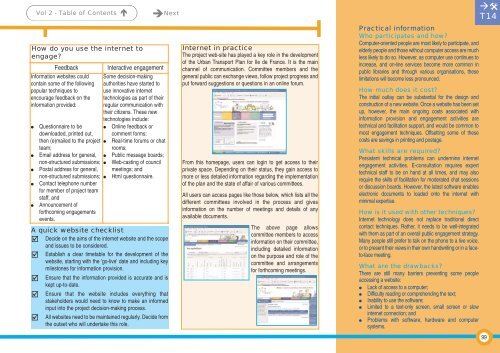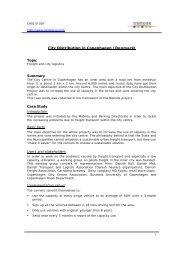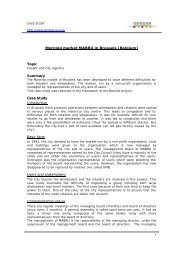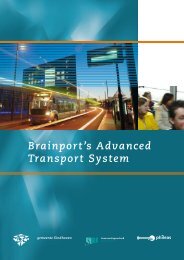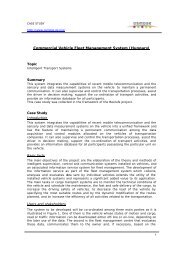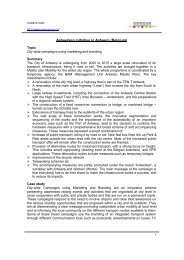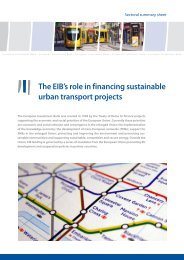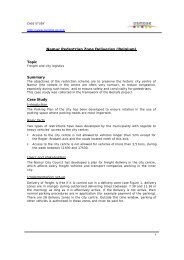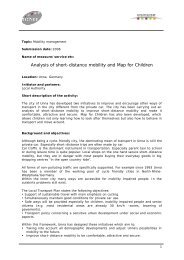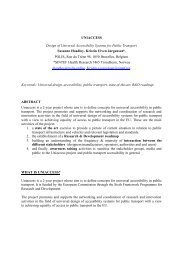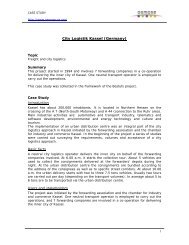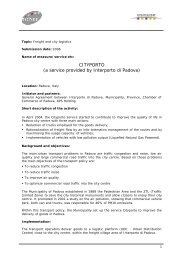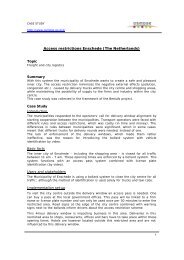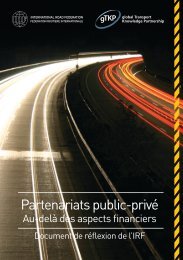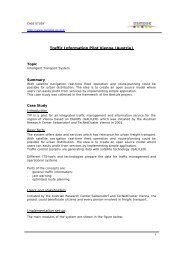Successful transport decision-making - Osmose
Successful transport decision-making - Osmose
Successful transport decision-making - Osmose
You also want an ePaper? Increase the reach of your titles
YUMPU automatically turns print PDFs into web optimized ePapers that Google loves.
Vol 2 - Table of Contents <br />
How do you use the internet to<br />
engage?<br />
Feedback Interactive engagement<br />
Information websites could<br />
contain some of the following<br />
popular techniques to<br />
encourage feedback on the<br />
information provided:<br />
Some <strong>decision</strong>-<strong>making</strong><br />
authorities have started to<br />
use innovative internet<br />
technologies as part of their<br />
regular communication with<br />
their citizens. These new<br />
technologies include:<br />
Questionnaire to be<br />
downloaded, printed out,<br />
Online feedback or<br />
comment forms;<br />
then (e)mailed to the project<br />
team;<br />
Real-time forums or chat<br />
rooms;<br />
Email address for general, Public message boards;<br />
non-structured submissions; Web-casting of council<br />
Postal address for general, meetings; and<br />
non-structured submissions; Html questionnaire.<br />
Contact telephone number<br />
for member of project team<br />
staff; and<br />
Announcement of<br />
forthcoming engagements<br />
events.<br />
A quick website checklist<br />
Decide on the aims of the internet website and the scope<br />
and issues to be considered.<br />
Establish a clear timetable for the development of the<br />
website, starting with the 'go-live' date and including key<br />
milestones for information provision.<br />
Ensure that the information provided is accurate and is<br />
kept up-to-date.<br />
Ensure that the website includes everything that<br />
stakeholders would need to know to make an informed<br />
input into the project <strong>decision</strong>-<strong>making</strong> process.<br />
All websites need to be maintained regularly. Decide from<br />
the outset who will undertake this role.<br />
Next Internet in practice<br />
The project web-site has played a key role in the development<br />
of the Urban Transport Plan for Ile de France. It is the main<br />
channel of communication. Committee members and the<br />
general public can exchange views, follow project progress and<br />
put forward suggestions or questions in an online forum.<br />
From this homepage, users can login to get access to their<br />
private space. Depending on their status, they gain access to<br />
more or less detailed information regarding the implementation<br />
of the plan and the state of affair of various committees.<br />
All users can access pages like those below, which lists all the<br />
different committees involved in the process and gives<br />
information on the number of meetings and details of any<br />
available documents.<br />
The above page allows<br />
committee members to access<br />
information on their committee,<br />
including detailed information<br />
on the purpose and role of the<br />
committee and arrangements<br />
for forthcoming meetings.<br />
Practical information<br />
Who participates and how?<br />
Computer-oriented people are most likely to participate, and<br />
elderly people and those without computer access are much<br />
less likely to do so. However, as computer use continues to<br />
increase, and on-line services become more common in<br />
public libraries and through various organisations, these<br />
limitations will become less pronounced.<br />
How much does it cost?<br />
The initial outlay can be substantial for the design and<br />
construction of a new website. Once a website has been set<br />
up, however, the main ongoing costs associated with<br />
information provision and engagement activities are<br />
technical and facilitation support, and would be common to<br />
most engagement techniques. Offsetting some of these<br />
costs are savings in printing and postage.<br />
What skills are required?<br />
Persistent technical problems can undermine internet<br />
engagement activities. E-consultation requires expert<br />
technical staff to be on hand at all times, and may also<br />
require the skills of facilitation for moderated chat sessions<br />
or discussion boards. However, the latest software enables<br />
electronic documents to loaded onto the internet with<br />
minimal expertise.<br />
How is it used with other techniques?<br />
Internet technology does not replace traditional direct<br />
contact techniques. Rather, it needs to be well-integrated<br />
with them as part of an overall public engagement strategy.<br />
Many people still prefer to talk on the phone to a live voice,<br />
or to present their views in their own handwriting or in a faceto-face<br />
meeting.<br />
What are the drawbacks?<br />
There are still many barriers preventing some people<br />
accessing a website:<br />
Lack of access to a computer;<br />
Difficulty reading or comprehending the text;<br />
Inability to use the software;<br />
Limited to a text-only screen, small screen or slow<br />
internet connection; and<br />
Problems with software, hardware and computer<br />
systems.<br />
<br />
T14<br />
99


